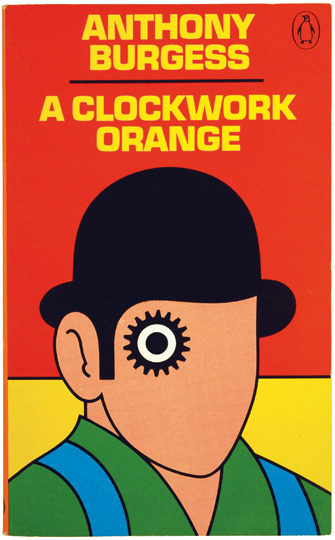A Clockwork Orange
by Anthony Burgess
Publisher: William Heinemann
First Published: 1962
Finished reading: 17th January 2012
Genre: Science-Fiction Novella
Rating: 2 / 5
Publisher: William Heinemann
First Published: 1962
Finished reading: 17th January 2012
Genre: Science-Fiction Novella
Rating: 2 / 5
 What can I say about A
Clockwork Orange? I can’t say that I enjoyed the book, but I also didn’t
dislike it. It’s very violent, so violent in fact that even I (someone who
professes to have a rather strong stomach) almost skipped a paragraph or too.
However, in the interest of this TIME Top 100 Challenge, I continued. Aside
from the violence though, it was quite a good plot. It draws similarities to 1984 in the way that it revolves around
political totalitarianism and the rebellious streak is kind of tortured out of
the protagonist.
What can I say about A
Clockwork Orange? I can’t say that I enjoyed the book, but I also didn’t
dislike it. It’s very violent, so violent in fact that even I (someone who
professes to have a rather strong stomach) almost skipped a paragraph or too.
However, in the interest of this TIME Top 100 Challenge, I continued. Aside
from the violence though, it was quite a good plot. It draws similarities to 1984 in the way that it revolves around
political totalitarianism and the rebellious streak is kind of tortured out of
the protagonist.
The setting is not so much a future reality as an alternate
one; however there are mentions of things from our ‘real world’, such as the
Nazi’s and WW2. However, again similarly to 1984
many new words make the reader almost work to understand some sentences
where rot means mouth, viddy means see and horrorshow means good.
A backdrop of drugs, rape and violence surrounds the story
of young Alex, of only fifthteen, as he and his ‘droogs’ carry on about their
business in this strange world. The novella is split into three separate parts,
the first of which being Alex’s world where we are shown what it means to be a
young delinquent in near future England. The reader is introduced to Dim,
Georgie and Pete; Alex’s friends as such and then shown how he is betrayed by
them. The whole first part does paint a picture, this much is true, but it can
be challenging to wrap your head around young Alex who despite being intelligent
and quick witted is also blatantly a sociopath. In the second part, Alex is
taken to prison and taken under the wing of the prison chaplain, who mistakes
his interest in the Bible as faith rather than a craving for the violent parts
of the Old Testament. By causing interest in his self, Alex is accepted into an
experimental behaviour altering programme called the Ludovico Technique which
seems to be a kind of aversion therapy. Although brutal the technique is
apparently effective and Alex is released back into society after just two
weeks. However, the return to society in part three is not as smooth as the
technique would quit want as Alex is rejected by his parents and
unintentionally encounters his old victims, and pays the price. He is taken
under the wing of a political activist who plans to use Alex as an
anti-Government tool but it unknowing that it was Alex’s doing that his wife
was killed two years previously.
Overall, I am not convinced that I can call the novella a
classic, but I can see that it has some appeal. I cannot say though, with full
confidence that I would recommend reading A
Clockwork Orange.

No comments:
Post a Comment